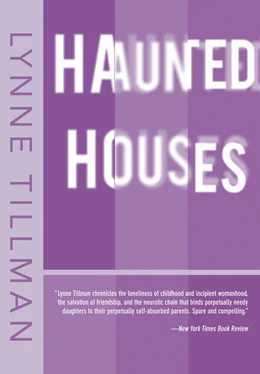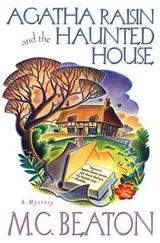A guy came into the bar when Grace was working and ordered a draft beer. He looked like Ricky Nelson as a teenager. Beautiful purple eyes with long lashes, a loose wet lower lip. He said his name was John, and several drafts later launched into the story of how his mother used to send love letters to his principal, a minister at a prep school, and how his brother was an actor in Hollywood but was more interested in producing. John was carrying a roll of burlap that was meant to cover the walls of his apartment. That was the saddest thing, Grace thought, burlap. So later in the night she went home with him, and he made love with his eyes open, watching her face, her eyes. Grace said he should stop pretending and just let himself go. She told him what she liked, and he did it again and again, and walking home in the morning, Grace felt that leaden laziness in her body, but couldn’t enjoy it too long because Sarah was sitting on Grace’s couch, screaming about how worried she’d been and where was she and why hadn’t she called. Grace told Sarah that she wasn’t her mother and she didn’t want another one, and when Grace told Mark about her new lovers, he said he was jealous. “But you have a boyfriend,” Grace insisted. Mark admitted he was jealous of them, not her.
Grace’s father wanted to visit Ruth’s grave. To place flowers on it, with his children. To show respect, he said. You know what Oscar Wilde had on his grave in Paris, Mark said. “His mourners will be outcasts, for outcasts always mourn.” Grace refused to go, saying she had to work. It was her brother who accompanied their father to the cemetery. Behind the bar, she carried on a silent dialogue with Ruth, playing both daughter and mother with an accuracy only she knew. Grace accused Ruth, defended herself, listened to what Ruth would have said in response, defended herself again, cursed her, provided other answers, remembered some things that softened her to her, remembered things that hardened her to her. She never expected to forgive her. And respect, that made her sick. You want to be respected, don’t you? You want to be a nice girl, don’t you? Grace looked at Mark and handed him a drink he hadn’t ordered and said, “Fuck respect. She didn’t give me anything."
John was beautifully unhappy, a lost soul like Montgomery Clift in The Misfits , which endeared him to Mark finally. He wasn’t a cowboy, but had enough of the West in him to please an Easterner like Grace, though there was something frail about him, as if he thought he didn’t have the right to be alive. He didn’t make demands or requests or anything. He was just around, the way many people were in Grace’s life. The connections were fragile, short-lived. People moved in and out and Grace said she never missed anyone. Every once in a while she phoned Maggie and said she might move back to Providence, but she didn’t and she didn’t visit as she kept promising. Maggie promised to come see Grace play Marilyn, for which Grace allowed her hair to be bleached blond, but Maggie didn’t keep her promise either. Grace recalled a conversation she’d had with Maggie — it was easier to remember the stories than the faces — back in Providence, about how Jackie Curtis had stopped dressing in drag because it was harder being a woman. They laughed until tears came to Grace’s eyes. Mark hardly ever wore dresses anymore, even at home. That time had passed. He told Grace he’d rather just be effeminate.
※
I’d like to thank C. Carr for encouraging me to do a book set in New York; Tom Keenan for our discussions, his enthusiasm and acuity; the MacDowell Colony for giving me a wonderful place to write, and all the people who contributed jokes: David Hofstra, Joe Wood, Paul Shapiro, Bob DiBellis, Eiliot Sharp, Mark Wethli, Jane Gillooly, Rick Lyon, James Welling, John Divola. Marc Ribot, Dennis Cooper, Larry Gross, Charlotte Carter, Andrea Blum, Osvaldo Golijov, Martha Wilson, Michael Smith, Dick Connette, Charles Karubian, and many others whose jokes have become mine. I’d like especially to thank Richard Kupchinsksas, Debbie Negron, and Ginette Schenk for talking with me for this project.
Lynne Tillman (New York, NY) is the author of five novels, three collections of short stories, one collection of essays and two other nonfiction books. She collaborates often with artists and writes regularly on culture, and her fiction is anthologized widely. Her novels include American Genius, A Comedy (2006), No Lease on Life (1998) which was a New York Times Notable Book of 1998 and a finalist for the National Book Critics Circle Award, Cast in Doubt (1992), Motion Sickness (1991), and Haunted Houses (1987). The Broad Picture (1997) collected Tillman’s essays, which were published in literary and art periodicals. She is the Fiction Editor at Fence Magazine, Professor and Writer-in-Residence in the Department of English at the University at Albany, and a recent recipient of a Guggenheim Fellowship.
About the book, and a letter from the publisher
This is a Red Lemonade book, also available in all reasonably possible formats: in limited artisan-produced editions, in trade paperback editions, and in all current digital editions, as well as online at the Red Lemonade publishing community.
A word about this community. Over my years in publishing, I learned that a publisher is the sum of all its constituent parts: above all the writers, of course, and yes, the staff, but also all the people who read our books, talk about our books, support our authors, and those who want to be one of our authors themselves.
So I started a company called Cursor, designed to make these constituent parts fit better together, into a proper community where, finally, we could be greater than the sum of the parts. The Red Lemonade publishing community is the first of these and there will be more to come — for the current roster of communities, see the Cursor website.
For more on how to participate in the Red Lemonade publishing community, including the opportunity to share your thoughts about this book, read what others have to say about it, and share your own manuscripts with fellow writers, readers, and the Red Lemonade editors, go to the Red Lemonade website.
Also, we want you to know that these sites aren’t just for you to find out more about what we do, they’re places where you can tell us what you do, what you want, and to tell us how we can help you. Only then can we really have a publishing community be greater than the sum of its parts.
All the best,
Richard Nash












